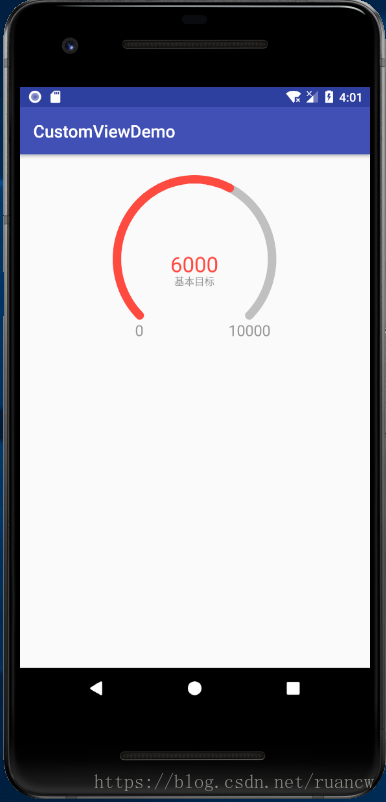前言:Android开发中,自定义View实现自己想要的效果已成为一项必备的技能,当然自定义View也是Android开发中比较难的部分,涉及到的知识有Canvas(画布),Paint(画笔)等,自定义控件分为三种:一是直接继承自View,完全的自定义;二是在原有控件的基础上进行改造,达到自己想要的效果;还有一种就是自定义组合控件,将已有的控件根据自己的需要进行组合实现的效果。本人对自定义View也是一知半解,简单记录下自己学习自定义View(继承自View)的过程,方便日后翻阅。
技术实现
1.ArcView继承自View
2.Canvas(画布)
3.Paint(画笔)
效果图:类似于QQ的计步效果

1.继承自View
(1)重写3个构造方法(新的API中的构造方法是4个)
public ArcView(Context context) { this(context,null);}public ArcView(Context context, @Nullable AttributeSet attrs) { this(context, attrs,0);}public ArcView(Context context, @Nullable AttributeSet attrs, int defStyleAttr) { super(context, attrs, defStyleAttr); //init();} (2)重写View的OnDraw方法
@SuppressLint("DrawAllocation")@Overrideprotected void onDraw(Canvas canvas) { super.onDraw(canvas); centerX=getWidth()/2; centerY=getHeight()/2; //初始化paint initPaint(); //绘制弧度 drawArc(canvas); //绘制文本 drawText(canvas);} 注:这里的paint初始化我放在了onDraw方法中进行的,当然你也可以放在有三个参数的构造方法中初始化。
2.Paint初始化
(1)圆弧的画笔mArcPaint
//圆弧的paintmArcPaint=new Paint(Paint.ANTI_ALIAS_FLAG);//抗锯齿mArcPaint.setAntiAlias(true);mArcPaint.setColor(Color.parseColor("#666666"));//设置透明度(数值为0-255)mArcPaint.setAlpha(100);//设置画笔的画出的形状mArcPaint.setStrokeJoin(Paint.Join.ROUND);mArcPaint.setStrokeCap(Paint.Cap.ROUND);//设置画笔类型mArcPaint.setStyle(Paint.Style.STROKE);mArcPaint.setStrokeWidth(dp2px(mStrokeWith)); (2)文字的画笔mTextPaint
//中心文字的paintmTextPaint=new Paint();mTextPaint.setAntiAlias(true);mTextPaint.setColor(Color.parseColor("#FF4A40"));//设置文本的对齐方式mTextPaint.setTextAlign(Paint.Align.CENTER);//mTextPaint.setTextSize(getResources().getDimensionPixelSize(R.dimen.dp_12));mTextPaint.setTextSize(dp2px(25)); 3.Canvas绘制
(1)圆弧的绘制
/** * 绘制圆弧 * @param canvas */private void drawArc(Canvas canvas) { //绘制圆弧背景 RectF mRectF=new RectF(mStrokeWith+dp2px(5),mStrokeWith+dp2px(5),getWidth()-mStrokeWith-dp2px(5),getHeight()-mStrokeWith); canvas.drawArc(mRectF,startAngle,mAngle,false,mArcPaint); //绘制当前数值对应的圆弧 mArcPaint.setColor(Color.parseColor("#FF4A40")); //根据当前数据绘制对应的圆弧 canvas.drawArc(mRectF,startAngle,mIncludedAngle,false,mArcPaint);} (2)文本的绘制
/** * 绘制文本 * @param canvas */private void drawText(Canvas canvas) { Rect mRect=new Rect(); String mValue=String.valueOf(mAnimatorValue); //绘制中心的数值 mTextPaint.getTextBounds(mValue,0,mValue.length(),mRect); canvas.drawText(String.valueOf(mAnimatorValue),centerX,centerY+mRect.height(),mTextPaint); //绘制中心文字描述 mTextPaint.setColor(Color.parseColor("#999999")); mTextPaint.setTextSize(dp2px(12)); mTextPaint.getTextBounds(mDes,0,mDes.length(),mRect); canvas.drawText(mDes,centerX,centerY+2*mRect.height()+dp2px(10),mTextPaint); //绘制最小值 String minValue=String.valueOf(mMinValue); String maxValue=String.valueOf(mMaxValue); mTextPaint.setTextSize(dp2px(18)); mTextPaint.getTextBounds(minValue,0,minValue.length(),mRect); canvas.drawText(minValue, (float) (centerX-0.6*centerX-dp2px(5)), (float) (centerY+0.75*centerY+mRect.height()+dp2px(5)),mTextPaint); //绘制最大值 mTextPaint.getTextBounds(maxValue,0,maxValue.length(),mRect); canvas.drawText(maxValue, (float) (centerX+0.6*centerX+dp2px(5)), (float) (centerY+0.75*centerY+mRect.height()+dp2px(5)),mTextPaint);} 4.添加动画效果及数据
(1)动画效果
/** * 为绘制弧度及数据设置动画 * * @param startAngle 开始的弧度 * @param currentAngle 需要绘制的弧度 * @param currentValue 需要绘制的数据 * @param time 动画执行的时长 */private void setAnimation(float startAngle, float currentAngle,int currentValue, int time) { //绘制当前数据对应的圆弧的动画效果 ValueAnimator progressAnimator = ValueAnimator.ofFloat(startAngle, currentAngle); progressAnimator.setDuration(time); progressAnimator.setTarget(mIncludedAngle); progressAnimator.addUpdateListener(new ValueAnimator.AnimatorUpdateListener() { @Override public void onAnimationUpdate(ValueAnimator animation) { mIncludedAngle = (float) animation.getAnimatedValue(); //重新绘制,不然不会出现效果 postInvalidate(); } }); //开始执行动画 progressAnimator.start(); //中心数据的动画效果 ValueAnimator valueAnimator = ValueAnimator.ofInt(mAnimatorValue, currentValue); valueAnimator.setDuration(2500); valueAnimator.setInterpolator(new LinearInterpolator()); valueAnimator.addUpdateListener(new ValueAnimator.AnimatorUpdateListener() { @Override public void onAnimationUpdate(ValueAnimator valueAnimator) { mAnimatorValue = (int) valueAnimator.getAnimatedValue(); postInvalidate(); } }); valueAnimator.start();} (2)数据添加
/** * 设置数据 * @param minValue 最小值 * @param maxValue 最大值 * @param currentValue 当前绘制的值 * @param des 描述信息 */public void setValues(int minValue,int maxValue, int currentValue,String des) { mDes=des; mMaxValue=maxValue; mMinValue=minValue; //完全覆盖背景弧度 if (currentValue > maxValue) { currentValue = maxValue; } //计算弧度比重 float scale = (float) currentValue / maxValue; //计算弧度 float currentAngle = scale * mAngle; //开始执行动画 setAnimation(0, currentAngle, currentValue,2500); 完整代码:
/** * Created by ruancw on 2018/6/13. * 自定义的圆弧形view */public class ArcView extends View { //根据数据显示的圆弧Paint private Paint mArcPaint; //文字描述的paint private Paint mTextPaint; //圆弧开始的角度 private float startAngle=135; //圆弧结束的角度 private float endAngle=45; //圆弧背景的开始和结束间的夹角大小 private float mAngle=270; //当前进度夹角大小 private float mIncludedAngle=0; //圆弧的画笔的宽度 private float mStrokeWith=10; //中心的文字描述 private String mDes=""; //动画效果的数据及最大/小值 private int mAnimatorValue,mMinValue,mMaxValue; //中心点的XY坐标 private float centerX,centerY; public ArcView(Context context) { this(context,null); } public ArcView(Context context, @Nullable AttributeSet attrs) { this(context, attrs,0); } public ArcView(Context context, @Nullable AttributeSet attrs, int defStyleAttr) { super(context, attrs, defStyleAttr); //init(); } private void initPaint() { //圆弧的paint mArcPaint=new Paint(Paint.ANTI_ALIAS_FLAG); //抗锯齿 mArcPaint.setAntiAlias(true); mArcPaint.setColor(Color.parseColor("#666666")); //设置透明度(数值为0-255) mArcPaint.setAlpha(100); //设置画笔的画出的形状 mArcPaint.setStrokeJoin(Paint.Join.ROUND); mArcPaint.setStrokeCap(Paint.Cap.ROUND); //设置画笔类型 mArcPaint.setStyle(Paint.Style.STROKE); mArcPaint.setStrokeWidth(dp2px(mStrokeWith)); //中心文字的paint mTextPaint=new Paint(); mTextPaint.setAntiAlias(true); mTextPaint.setColor(Color.parseColor("#FF4A40")); //设置文本的对齐方式 mTextPaint.setTextAlign(Paint.Align.CENTER); //mTextPaint.setTextSize(getResources().getDimensionPixelSize(R.dimen.dp_12)); mTextPaint.setTextSize(dp2px(25)); } @SuppressLint("DrawAllocation") @Override protected void onDraw(Canvas canvas) { super.onDraw(canvas); centerX=getWidth()/2; centerY=getHeight()/2; //初始化paint initPaint(); //绘制弧度 drawArc(canvas); //绘制文本 drawText(canvas); } /** * 绘制文本 * @param canvas */ private void drawText(Canvas canvas) { Rect mRect=new Rect(); String mValue=String.valueOf(mAnimatorValue); //绘制中心的数值 mTextPaint.getTextBounds(mValue,0,mValue.length(),mRect); canvas.drawText(String.valueOf(mAnimatorValue),centerX,centerY+mRect.height(),mTextPaint); //绘制中心文字描述 mTextPaint.setColor(Color.parseColor("#999999")); mTextPaint.setTextSize(dp2px(12)); mTextPaint.getTextBounds(mDes,0,mDes.length(),mRect); canvas.drawText(mDes,centerX,centerY+2*mRect.height()+dp2px(10),mTextPaint); //绘制最小值 String minValue=String.valueOf(mMinValue); String maxValue=String.valueOf(mMaxValue); mTextPaint.setTextSize(dp2px(18)); mTextPaint.getTextBounds(minValue,0,minValue.length(),mRect); canvas.drawText(minValue, (float) (centerX-0.6*centerX-dp2px(5)), (float) (centerY+0.75*centerY+mRect.height()+dp2px(5)),mTextPaint); //绘制最大指 mTextPaint.getTextBounds(maxValue,0,maxValue.length(),mRect); canvas.drawText(maxValue, (float) (centerX+0.6*centerX+dp2px(5)), (float) (centerY+0.75*centerY+mRect.height()+dp2px(5)),mTextPaint); } /** * 绘制当前的圆弧 * @param canvas */ private void drawArc(Canvas canvas) { //绘制圆弧背景 RectF mRectF=new RectF(mStrokeWith+dp2px(5),mStrokeWith+dp2px(5),getWidth()-mStrokeWith-dp2px(5),getHeight()-mStrokeWith); canvas.drawArc(mRectF,startAngle,mAngle,false,mArcPaint); //绘制当前数值对应的圆弧 mArcPaint.setColor(Color.parseColor("#FF4A40")); //根据当前数据绘制对应的圆弧 canvas.drawArc(mRectF,startAngle,mIncludedAngle,false,mArcPaint); } /** * 为绘制弧度及数据设置动画 * * @param startAngle 开始的弧度 * @param currentAngle 需要绘制的弧度 * @param currentValue 需要绘制的数据 * @param time 动画执行的时长 */ private void setAnimation(float startAngle, float currentAngle,int currentValue, int time) { //绘制当前数据对应的圆弧的动画效果 ValueAnimator progressAnimator = ValueAnimator.ofFloat(startAngle, currentAngle); progressAnimator.setDuration(time); progressAnimator.setTarget(mIncludedAngle); progressAnimator.addUpdateListener(new ValueAnimator.AnimatorUpdateListener() { @Override public void onAnimationUpdate(ValueAnimator animation) { mIncludedAngle = (float) animation.getAnimatedValue(); //重新绘制,不然不会出现效果 postInvalidate(); } }); //开始执行动画 progressAnimator.start(); //中心数据的动画效果 ValueAnimator valueAnimator = ValueAnimator.ofInt(mAnimatorValue, currentValue); valueAnimator.setDuration(2500); valueAnimator.setInterpolator(new LinearInterpolator()); valueAnimator.addUpdateListener(new ValueAnimator.AnimatorUpdateListener() { @Override public void onAnimationUpdate(ValueAnimator valueAnimator) { mAnimatorValue = (int) valueAnimator.getAnimatedValue(); postInvalidate(); } }); valueAnimator.start(); } /** * 设置数据 * @param minValue 最小值 * @param maxValue 最大值 * @param currentValue 当前绘制的值 * @param des 描述信息 */ public void setValues(int minValue,int maxValue, int currentValue,String des) { mDes=des; mMaxValue=maxValue; mMinValue=minValue; //完全覆盖 if (currentValue > maxValue) { currentValue = maxValue; } //计算弧度比重 float scale = (float) currentValue / maxValue; //计算弧度 float currentAngle = scale * mAngle; //开始执行动画 setAnimation(0, currentAngle, currentValue,2500); } public float dp2px(float dp) { DisplayMetrics metrics = Resources.getSystem().getDisplayMetrics(); return dp * metrics.density; }} 总结:设置Paint的画笔形状(Cap和Join设置为弧形);使用Canvas的drawArc方法绘制圆弧及drawText绘制文本信息等;ValueAnimator设置数据及当前圆弧进度的动画效果。
以上就是本文的全部内容,希望对大家的学习有所帮助,也希望大家多多支持VEVB武林网。
注:相关教程知识阅读请移步到Android开发频道。